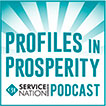David Heimer: Great introduction to the industry. You’ve been in it from a variety of places. One of the things I’ve always found really fascinating about you is the structure and relationship in your business. Many business partnerships, maybe most of them in our industry, fail eventually. And you always hear from consultants, don’t do 50/50 partnerships. But you and Bart, your business partner, have been friends and 50/50 partners for years and to all appearances, you’re both thriving. So I was wondering if you could tell us how you guys make it work. But could you start off with that very interesting story about how you met Bart?
Steve Simmons: Well, while I was working for the plumbing wholesaler and HVAC wholesaler, I was back covering a city sales desk for lunch one day. And this guy walks in with a beard, coveralls, obviously just a working guy, and he lays his bill down on the counter and says, hey, I need to talk to somebody about this bill. Well, naturally, I figured he’s going to complain or not be able to pay it or something. And instead he says, I got a quote on this water heater for like $129, but you only billed me 99. So I corrected him and said, you mean, we quoted you 99 and billed you 129. And he goes, nope. I got a price of 129, you only billed me $99. So after I picked myself up off the floor, I asked him, what do you want? And he said, well, I owe you $30. And I’m just sitting there looking at him and then he goes, I just want exactly what we agreed on and I expect if you ever over billed me to make sure you correct that. I told him I was taking him to lunch that day. And we’ve been best friends for over 35 years and partners for 25.
David Heimer: That’s such a great story. It speaks to the kind of guy he is, right?
Steve Simmons: He’s absolutely amazing. I’m unbelievably blessed to have him as a friend or partner, it’s crazy.
David Heimer: Yeah. So tell me about the 50/50 partnership.
Steve Simmons: Well, how that happened is, I was working for Lennox and I had actually helped set Bart up as a Lennox dealer years before. And we stayed in contact over the years and talked, you know, two to three times a month. And over those years he kept teasing me saying like, come back here and go to work for me. And we just kind of laugh and joke about it. And then I really enjoyed my job, but wasn’t enjoying corporate life. So one day he called me and he said, you know – give me the come on back and go to work for me. And I go, no, I don’t want to do that, but I’ll buy half of the business from you.
And we actually talked about it a bit. And several months later, I left Denver, Colorado with my family for the Hamlet of Schuyler Nebraska, population of just under 4,000. And one of the things that we talked about was doing the partnership and I said, the only way I would do it would be if we were equal partners. And I’d been around the HVAC industry for a long time and worked with a lot of dealers and dealerships and I’d seen the vast majority of the partnerships that I’ve been associated with, not me personally, but as either a territory manager or a rep or something, pretty much most of them ended just acrimoniously. I mean, there was never any love for each other. Something happened and everything went south.
I just determined that I didn’t want that to happen to us. So what we did, we sat down when we were designing the articles of incorporation and came up with a couple of rules. The first one is that only one person can run the company. You can’t have two people putting yourself in a position of indecision. So we agreed that whoever was president would have the final say so over anything that we needed to have done. If a decision needed to be made, that was the decision we went with. But we also put into effect what we called a rotating officer’s stipulation. So that every two years or 24 months, whoever was president during the previous term became vice-president during the second term. So what that created is basically you had a two year term limit, and if there was a disagreement – and we’ve had some disagreements, I mean, never arguments or anything – but we’ve had situations where I don’t think we should do that. And the other one says, well, I think we should.
And it depends on if Bart was president, I would go along with what he says and then try and support that one hundred percent knowing full well that in two years, if we were just going to be bullies and have our own way, that could all be reversed within the next 24 months. So it was a lot easier to look forward and to also get consultative support instead of demanding support. And it’s just worked out really well because we both look for the good of each other and understand that you have to have the support in order to get everything done.
David Heimer: And after all this time, you guys are still great friends, right?
Steve Simmons: Yeah. I would say we’re best friends. And in many ways he’s closer than my brothers. So he’s just an awesome guy.
David Heimer: That’s great. Have you ever heard of this structure being used anywhere else? You know, the rotating president or rotating officers?
Steve Simmons: No, I honestly can’t say that I have. I think it’s a pretty good idea. We’re kind of unique. I mean, that’s still part of the articles of incorporation, but realistically, we’ve never even had to implement the process because we’ve never gotten to the point where one person was demanding their way. We have always found a way to work things out. So it’s become a moot point, but it’s nice just knowing it’s back there. I used to call it the mutually assured destruction clause, that if somebody wants to be just a bully and have their own way, it could be reversed in a matter of months so it’s futile to try and do that.
David Heimer: It’s a very interesting structure. I’d never heard of it before. I think it’s amazing and credit to you guys for coming up with it. Aside from that, there’s other things. If you were talking to somebody entering the business and they’re going to have a partnership, what advice would you give them about making it work well? I guess it sounds like marriage counseling, doesn’t it?
Steve Simmons: I’d say there’s a lot to do with that. The key thing here – and it kind of goes back to that first day we met, when he told me about his bill – I had absolute faith that I could trust him. And he felt the same way about me. We knew there was no need or desire to be deceptive and that we were both working for the good of each other. So I would say if you don’t have that kind of relationship, you might want to think twice about going into business with a partner. Bart points out – we have an acquaintance in another town that formed a partnership in a plumbing business, and they were always suspicious of each other. I mean, one guy even had the other guy followed around thinking he wasn’t pulling his fair share. I can’t {inaudible 08:54} that.
So if I had any advice – first of all, one of the primary things for us is we both share a common faith in Christ and that’s a pretty strong foundation to build upon. So we started with that. The fact that we had that first interaction that exposed us with no reason to have to trust each other. To see an example of one person being totally transparent and honest, and the other one responding to that, I guess that would be what I would tell you. It is to make sure you understand the character of the person you’re becoming a partner with.
David Heimer: Good advice. So you’ve got a quote that is on your profile on the Service Roundtable website, and I find it absolutely fascinating. I’ll read it here. It says, I’m determined to be the featured company owned by a 60 plus year old that made a major step in improving our company, our team, and our presence in the communities we serve. I’d appreciate your prayers that we’re successful in achieving all that God sets out for us. So can you tell me about that?
Steve Simmons: Yeah. Obviously, I’ve been in this industry for quite a while. Like I said, I started working at a gas company in my 20s. I’m now 66. And over the years, I’ve seen – there’s a great deal of celebration and celebrating the success of young business people. As there should be. I think that’s really amazing what some of the younger people are doing and how they’re implementing strategies and just, you know, blowing the doors off stuff. However, as I look back at the last 25 years, and then most importantly, look forward to the next 10, I felt I just wasn’t done with everything that the Lord had for me yet.
Well, I could retire and probably have a fairly comfortable life. I thought, you know, like me, there’s probably a lot of other guys out there and women my age that either hadn’t achieved what they wanted, or they were fearful that what they had done may not provide enough for their future. So I just kept looking for the next step in my life. And I was just never content to sit back and accept the status quo. But still I wasn’t really moving forward, you know. It was kind of like being on an agitated treadmill, I guess. Then I got an invitation to a Success Day there in Omaha, I guess it’s, you know, 40 miles away. In fact, I think I met you there, it was the first one I believe. You know, interesting, I thought, but I didn’t really take any action.
And over the next three years, it just kept eating at me that we had not yet become what we’re intended to be, you know, as far as the business. And I finally decided to quit analyzing it and just act. And we joined Service Station Alliance and wow, what an illuminating experience. Many of the myths I believed just got shattered and, you know, the lid I put on myself regarding our business, it’s just gone. The future is incredibly exciting. I used to believe our size was limited by our demographic of, you know, like a rural central Nebraska and very sparse population density. Then I spoke with another Service Station Alliance member, Chris hunter, and Chris had just achieved phenomenal growth in a demographic that’s actually worse than ours, I mean, I couldn’t believe it. And we’re pretty close to being identical, you know, for all intents and purposes. But he shared how the Service Station leadership helped him achieve far more than I would have ever thought possible.
I would think most people would feel the same way. But seeing is believing, and I’m a believer. I’ll tell you, after going down and visiting Chris and talking to him, and I consider him a close friend now, we fully committed to learning from the Service Nation programs and the leadership people there and all the people that are associated with it. You know, we decided that we’re not going to try and mold the proven ideas that successful people are implementing into our concept of how things should be done. I always used to think I know better, or I can do it better. Well, you know, I quit trying to reinvent the wheel. Since doing that, we’ve seen some tremendous changes at Air Comfort. I mean, we’re growing, people are excited, we have a path, we’ve got a plan and best of all, we’re working towards it. And it’s just been awesome.
All this reminded me of my thoughts, you know, where my thoughts were a few years ago. All the other contractors out there my age, who’d worked so hard for so many years, but just hadn’t achieved all they’d hoped for. And I felt especially bad for those that have just accepted the lie that this is all that there is and it’s all there’s going to be for, you know, themselves and their families. So I believe what’s been set before us is to be an example for people in that position. There are literally hundreds of HVAC contractors out there in their fifties and sixties, wondering what the future holds. And Bart and I, we intend to be proof that – like my favorite book is titled – It’s Always Too Soon To Quit. If you have a desire and you’re willing to take the lid off your thinking, you can be successful beyond your expectations.
You know, even at 60 plus years old, I’ve got some goals personally, to help benchmark that. We recently won that Service Station Alliance Extraordinary Outlook award for 2017. We had our new truck design featured in a National Trade Magazine. I’ve been approached by a realtor’s group to come speak at their big meeting and I was given a chance to be part of a Success Day recently. And all those things are examples of achieving goals we set up as part of our vision statement. So I just want to do everything I can to help others – what I call senior contractors out there – realize that it’s never too late to take action and do something about your situation. And in fact, it can be downright exciting and exhilarating. You know, we like to say around here, let’s roll.
David Heimer: That’s fantastic. Thank you so much for sharing that with us. And I couldn’t agree more with what you said. I think that there’s many people that approach what they perceive as the end of their career, and really there’s still so much more opportunity out there for them. And I know you’ve seen it as well, where people decide that there’s nothing more left for them and they end up selling their company for a pittance of what it could be worth and riding off into the sunset, I guess. It’s just heartbreaking to see that.
Steve Simmons: That’s what I mean. When I was a territory manager, I went to far more auctions than I ever desired to, and you could just see the heartache and all the disappointment of thinking all those years and all that time and energy I put in, and this is what it all comes down to. And it doesn’t have to be that way. I’m just hoping, you know, that we follow the steps set before us and that as we become more successful at what we’re doing, that we can be an example to help other people and just show them, like, don’t give up. Let’s get it done.
David Heimer: Well, Steve Simmons, thank you so much for taking the time to talk with me today. It’s always a pleasure to talk with you. I know that you and Bart are going to continue to grow your company and you guys are going to enjoy greater and greater levels of success. And I’m looking forward to a follow-up to hear more about that in the future.
Steve Simmons: Looking forward to it David. Really appreciate it.
David Heimer: Alright. Thanks very much. Bye.
Outro: We’re always looking for good ideas and interviews for our podcast. If you have an idea, or maybe you think you should be interviewed, just shoot an email to profilesinprosperity@serviceroundtable.com. That’s profilesinprosperity@serviceroundtable.com. If you think what we’re doing has any value, it would be very helpful if you would give us a great rating on iTunes. Thanks for your support. Hope to see you again soon. Bye.





 (877) 807-0869
(877) 807-0869 Member Login
Member Login

